“I would be happy to help.”
We were meeting to discuss my dissertation.
We agreed to meet at a local coffee shop near his home.
I saw him from inside the place as he made his way down the sidewalk. His gait was bent forward as he walked. I judged his age past 80. He had lived in Wheaton since his undergrad days—after he served in the British military—in 1947. Arthur Holmes began teaching at Wheaton in 1951 and was able to get his doctoral degree at Northwestern University there in Chicago. 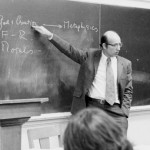
That day I asked him many questions. One in particular had to do with why he turned down an opportunity to be “Academic Dean” at Bethel College in Minneapolis. “Why did you reject an opportunity to influence change from a position of ‘power’?” I asked.
His response spoke of his gifting. Holmes believed he had a much better opportunity to speak to the concerns of faith-learning integration as a “free speaking professor.” He said we must concentrate on “large constructs, conduits, connections of ideas from theology” rather than coming from a the biblical text.
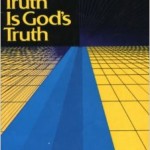 It was a delightful conversation. We talked about books and thinkers—past and present—while making connections to the classroom. We talked about how important literature was in creating “a good society.” I offered Vigen Guorian’s idea that the best class a person interested in business could take would be to study classic works of literature so as to create a foundation for character. He was quite taken with this suggestion.
It was a delightful conversation. We talked about books and thinkers—past and present—while making connections to the classroom. We talked about how important literature was in creating “a good society.” I offered Vigen Guorian’s idea that the best class a person interested in business could take would be to study classic works of literature so as to create a foundation for character. He was quite taken with this suggestion.
We then discussed the impact of story in the context of literature and I shared my use of film over the last twenty years (the “stories” of our day). Again, he was pleased noting that Roger Lundin (then, literature teacher at Wheaton, also chair of the Faith and Learning Center for teacher development) was just teaching a Sunday School class at his church where they watched “a bit of a film.”
We discussed how he could serve on my dissertation committee since my focus was his life long pursuit of faith-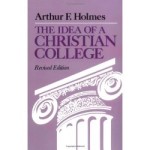 learning integration. He happily complied with my requests.
learning integration. He happily complied with my requests.
“Now, be sure to send me your results when they come in,” he admonished. I assured him I would. And I did. Dr. Holmes and I sent a number of emails back and forth to each other through the doctoral process. His last missive to me was warmly congratulatory.
That day, I asked him to sign a book. He was most gracious in his assent. “My job now is to encourage those who follow.” I had the privilege being one of those during his last decade on earth.
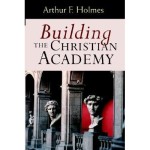 Arthur Holmes died in October, 2011, four years after we met. It was a sad day. I cherish the opportunity to have talked with and been guided by such an Evangelical presence for Christian academic integration. Bright lights in Christian university settings owe their beginnings to Holmes. C. Stephen Evans, Mark Noll, David Lyle Jeffrey, Roger Lundin: the list seems endless. Evans, in his essay to honor his much loved teacher-mentor remarked about Arthur Holmes’ impact in the lives of his students. Holmes was not only tireless in his commitment to faith-learning integration in his teaching but the lessons were ingrained through personal discipleship. One short sentence summarizes Evans’ lovely eulogy:
Arthur Holmes died in October, 2011, four years after we met. It was a sad day. I cherish the opportunity to have talked with and been guided by such an Evangelical presence for Christian academic integration. Bright lights in Christian university settings owe their beginnings to Holmes. C. Stephen Evans, Mark Noll, David Lyle Jeffrey, Roger Lundin: the list seems endless. Evans, in his essay to honor his much loved teacher-mentor remarked about Arthur Holmes’ impact in the lives of his students. Holmes was not only tireless in his commitment to faith-learning integration in his teaching but the lessons were ingrained through personal discipleship. One short sentence summarizes Evans’ lovely eulogy: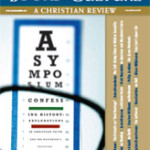
[We] were transformed by being Art’s students. [1]
“My job now is to encourage those who follow.”
Every day I remember Dr. Holmes’ words. I pray this attitude may be my own.
Mark owns all of Holmes’ written works. Each is full of running commentary, exclamation points, and underlining. Dr. Eckel quotes Holmes often because we all stand on the shoulders of giants. A brief, though incomplete, reference list of Holmes’ works appears below the footnote from Dr. Eckel’s dissertation reference list.
[1] C. Stephen Evans, “Arthur Holmes, A Life Well Lived,” Books and Culture, Jan-Feb 2012.
Holmes, Arthur F. 1977. All truth is God’s truth. Grand Rapids, MI: Eerdmans.
__________. 1985. “Toward a Christian view of things.” In The making of a Christian mind: A Christian world view and the academic enterprise, ed. Arthur F. Holmes, 11-28. Downers Grove, IL: InterVarsity Press.
__________. 1987. The Idea of a Christian College. Reprint, Grand Rapids, MI: Eerdmans (page references are to the reprint edition).
__________. 1994a. Is a Christian university possible? Faculty Dialogue 21 (Summer): 25-29.
__________. 1994b. “What about student integration?” Journal of Research on Christian Education 3 (Spring): 3-5.
__________. 1999. “Integrating faith and learning in a Christian liberal arts institution.” In The future of Christian higher education, ed. David S. Dockery and David P. Gushee, 155-72. Nashville, TN: Broadman & Holman.
__________. 2001. Building the Christian academy. Grand Rapids, MI: Eerdmans.
__________. 2003. “The closing of the American mind and the opening of the Christian mind: Liberal learning, great texts, and the Christian college.” In Faithful learning and the Christian scholarly vocation, ed. Douglas V. Henry and Bob R. Agee, 101-22. Grand Rapids, MI: Eerdmans.

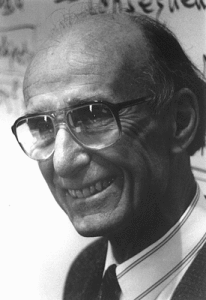
Thanks so much for this wonderful tribute. Good job. I never met him, but feel as if I’ve been profoundly influenced by him (and his orbit of others whom he taught.) Very grateful.
I had heard of Holmes’ book “All Truth is God’s Truth”.
I think that faith-learning integration is severely important. I have always been VERY opinionated about what education should be like and it has been a lot like his. My view of education continues to grow, and I cannot help but feel that I share in Byron’s feelings of having never met this man and yet feeling as though I’ve been profoundly influenced by him.
And he was a WW2 vet. It’s always a shame when our elders go to be with the LORD. So much knowledge and wisdom is lost, so much history. You can read about history in a book–but it’s not like talking to those who actually lived it. I try to glean all I can from my elders. I am quite glad for them.